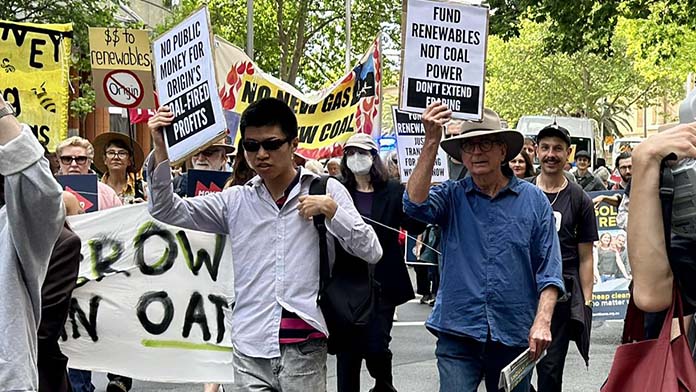After the hottest July and September on record, the need for action on global heating is more obvious than ever.
Blockades and direct action targeting fossil fuel infrastructure have become an important focus for activists who recognise the urgency of action. In late November, large numbers are expected to join a blockade of world’s largest coal port in Newcastle.
However, the climate movement also needs to take seriously the need for a just transition for fossil fuel workers and their communities.
For decades fossil fuel companies and right-wing politicians have presented climate action as a threat to workers’ jobs, using this as an excuse to delay action.
Scott Morrison won the 2019 election largely on this basis, capitalising on Labor’s equivocation over coal and anger at the climate convoy led by Bob Brown to the Adani mine site in Queensland.
Yet no government has ever developed a serious transition plan for fossil fuel workers that would guarantee alternative, well-paid jobs.
Coal power plants are facing closure across the country. The Eraring coal power station in NSW was scheduled to close in 2025. Workers have been offered retraining but do not have alternative jobs to go to.
This means many of them will welcome the NSW Labor government’s plan to extend the life of Eraring—making it harder for the climate movement to mobilise opposition to the move.
But keeping it open is a disaster for the climate. The hundreds of millions of dollars needed for this should be spent on publicly-owned renewable energy rather than subsiding the profits of power company Origin.
Similarly there is nothing in place to retrain and guarantee jobs for the thousands of workers in coal-dependent areas like the Hunter Valley or Queensland. The decimation of regional TAFEs has made the prospect of transition even more remote.
The climate movement has made good progress on taking up demands for a just transition. The enormous School Strike in September 2019, where the Electrical Trades Union (ETU), Maritime Union of Australia (MUA) and an ex-fossil fuel worker spoke from the stage in Sydney, was a clear example.
Ignoring the concerns of fossil fuel workers about jobs risks setting the campaign back. It sends a message to workers everywhere that climate activists are indifferent to their fate.
Newcastle blockade
Unions in the Newcastle coal port have made it clear they do not believe the blockade in November should go ahead as planned, and that it risks putting working class communities offside. This includes the MUA and ETU, who have supported climate action initiatives like School Strikes and the campaign against the Narrabri gas project.
The MUA has also been campaigning to establish an offshore wind project off Newcastle, which the existing port could service.
Rising Tide have added a demand for a just transition to their event. But the action is widely understood to be calling for the immediate closure of the port.
Millions of workers across Australia, including in Newcastle, want to see action on climate.
Workers’ strike action has far more power to shut down industry than any direct action protest. It’s crucial that the climate movement find ways of working with workers and their unions.
Closures of coal-fired power stations across the country so far have largely left workers on the scrap heap. The shut down of previous industries such as the Newcastle steel works in 1999 have left communities devastated.
Meanwhile, wages and conditions in many renewable energy projects are shockingly bad, as unions organising in the industry have shown.
Good work is being done by groups like the Hunter Jobs Alliance, alongside unions and other environmentalist groups, to bring workers into the movement. And unions have historically played a central role in environmental campaigns in Australia, from the Green Bans and anti-nuclear campaigns to the School Strikes.
Ignoring the unions representing workers in fossil fuels and ports risks undermining these efforts.
Climate activists must make it clear that we on workers’ side and demand that no worker is left worse off when fossil fuel projects close.
We must demand that new, well paid, unionised jobs are created in fossil fuel dependent regions, in renewable energy, manufacturing, transport, education and more.
This also means demanding that the government build and run renewable energy projects, rather than leaving it up to the market.
Climate activists are right to be demanding urgent action. But to build the kind of mass movement needed to win real change, we need a movement that can draw in the enormous collective power that workers have to change society.
By Caitlin Doyle






